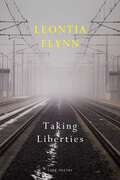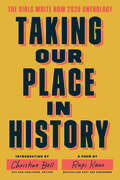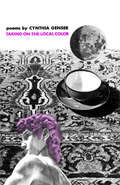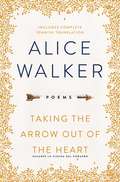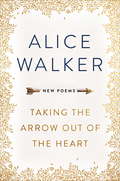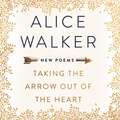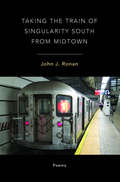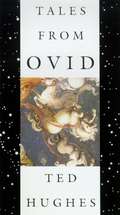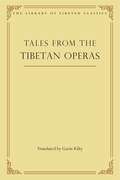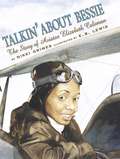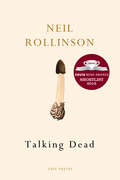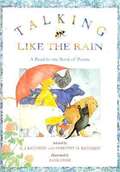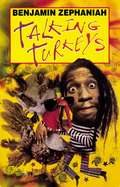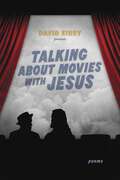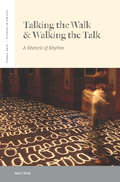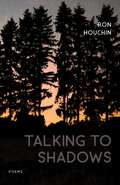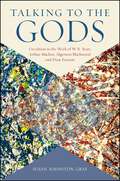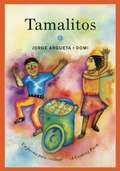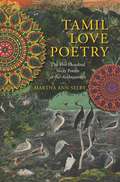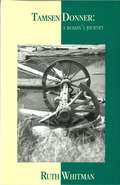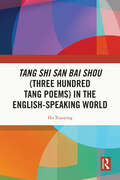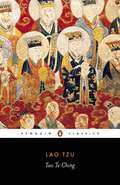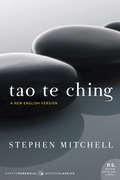- Table View
- List View
Taking Liberties: ‘Everyone should be reading her’ Observer
by Leontia FlynnA collection about motherhood at a time of continuous crisis - from one of Ireland's most important poets'Everyone should be reading her' OBSERVER'One of the most accomplished poets of her generation'GUARDIANThese poems emerge from the experience of being a single mother in Belfast, and against a background of seemingly continuous crisis. Political upheaval and anxiety, violence and death are all registered in these poems, which ask questions about where independence is balanced by our relationships with others, and where our inner lives meet the globally connected world.These are poems about cities - living, travelling and working in cities, getting sick and dying in cities - but also about retreating from all that: to her daughter at home, the budgie, cat and tortoise, or escaping to the park, the municipal pool, the Irish countryside, Newfoundland, or Paris, or into a Nina Simone song.This is a necessary book - a book very much of our time - with a consistent tone that is brave and bleak, but which also carries with it some much-needed humour, and a wealth of beautiful writing.
Taking Our Place in History: The Girls Write Now 2020 Anthology
by Girls Write NowThe award-winning annual anthology from New York City’s first and only writing and mentoring organization for girls and gender-expansive teens. <p><p> What is it like growing up in New York City as a teen in 2020? This book invites you into their homes and families, their schools and neighborhoods, their hearts, hopes, and fears. Enter a world where clay creatures take on aluminum oppressors. Get thrown against an elevator wall in the midst of a horror story. Go backstage with a rock band, say goodbye to relatives as you start a new life, stand with an engineer solving a coding problem. Experience tragedy in a mosque, feel the wounds of slavery, know the terror of glass shattering in a World War II village, and see how this next generation of leaders looks to the past and writes a better future for us all. <p><p> For more than two decades, the nationally award-winning nonprofit Girls Write Now has broken down the barriers of gender, race, age, and poverty, elevating the voices of writers who are too often not heard—or worse, silenced. With mentors by their sides, the girls and gender-nonconforming youth tackle climate change, racism, sexism, rejection, immigration, and friendship—and take their place in history. This book is their testament.
Taking on the Local Color: Poems (Wesleyan Poetry Program)
by Cynthia GenserCynthia Genser's landscapes, like those of D.H. Lawrence, are analogues of human emotions; her men and women exist in their effects-prototypes one minute, passionate and distinctly visible individuals the next. Person and place invite the reader into an adventure that begins and ends everywhere.The language employed throughout is voluptuous, sensuous, yet precise. The appeal is to all the senses as well as to reason and intelligence: the poems, seamed with a difficult, sweaty beauty, stimulate every pleasure center. But pure language play also leads to hard, intelligent sense.Of her own work, Cynthia Genser has said, "Although I belong to no special school or group, I align my poetry with the work of others aiming their metaphors at the banality and reductionism of our world-at the terror or planned obsolescence, Vogue Magazine, the threat of nuclear warfare. I cannot agree more with the Marxist Henri Lefebvre that poetry is the enemy and eventual victor in the war against 'terrorism' and the terrorist society we now live in."
Taking the Arrow Out of the Heart
by Alice WalkerAlice Walker, author of the National Book Award and Pulitzer Prize-winning The Color Purple—“an American novel of permanent importance” (San Francisco Chronicle)—crafts a bilingual collection that is both playfully imaginative and intensely moving.Presented in both English and Spanish, Alice Walker shares a timely collection of nearly seventy works of passionate and powerful poetry that bears witness to our troubled times, while also chronicling a life well-lived. From poems of painful self-inquiry, to celebrating the simple beauty of baking frittatas, Walker offers us a window into her magical, at times difficult, and liberating world of activism, love, hope and, above all, gratitude. Whether she’s urging us to preserve an urban paradise or behold the delicate necessity of beauty to the spirit, Walker encourages us to honor the divine that lives inside all of us and brings her legendary free verse to the page once again, demonstrating that she remains a revolutionary poet and an inspiration to generations of fans.
Taking the Arrow out of the Heart
by Alice WalkerAlice Walker, author of the Pulitzer Prize-winning modern classic, The Color Purple, returns with a poetry collection that is both playfully imaginative and intensely moving. In Taking the Arrow Out of the Heart, Alice Walker examines our troubled times, while also chronicling a life well-lived. From poems of painful self-inquiry, to celebrating the simple beauty of everyday life, Walker offers us a window into her magical, at times difficult, and liberating world of activism, love, hope and, above all, gratitude. Whether she's urging us to preserve an urban paradise or behold exploring the necessity of beauty to the spirit, Walker demonstrates that she remains a revolutionary poet and an inspiration to generations of fans.
Taking the Arrow out of the Heart
by Alice WalkerAlice Walker, author of the Pulitzer Prize-winning modern classic, The Color Purple, returns with a poetry collection that is both playfully imaginative and intensely moving. In Taking the Arrow Out of the Heart, Alice Walker examines our troubled times, while also chronicling a life well-lived. From poems of painful self-inquiry, to celebrating the simple beauty of everyday life, Walker offers us a window into her magical, at times difficult, and liberating world of activism, love, hope and, above all, gratitude. Whether she's urging us to preserve an urban paradise or behold exploring the necessity of beauty to the spirit, Walker demonstrates that she remains a revolutionary poet and an inspiration to generations of fans.
Taking the Arrow out of the Heart
by Alice WalkerAlice Walker, author of the Pulitzer Prize-winning modern classic, The Color Purple, returns with a poetry collection that is both playfully imaginative and intensely moving. In Taking the Arrow Out of the Heart, Alice Walker examines our troubled times, while also chronicling a life well-lived. From poems of painful self-inquiry, to celebrating the simple beauty of everyday life, Walker offers us a window into her magical, at times difficult, and liberating world of activism, love, hope and, above all, gratitude. Whether she's urging us to preserve an urban paradise or behold exploring the necessity of beauty to the spirit, Walker demonstrates that she remains a revolutionary poet and an inspiration to generations of fans.(p) Simon & Schusters US 2018
Taking the Train of Singularity South from Midtown
by John J. RonanThe general theme of this book, and a number of its individual poems, is that love and language create community. There is little self- reference and confession. Set in Gloucester, New York, or Paris, in Panama or Newtown, the poems come from a commitment to civic poetry, a poetry of social place and witness. Civic poetry is poems written for the public on community topics; poetry accessible to an attentive, general audience. And since it is often meant to be read in public, civic poetry relies on sound and familiar forms: rhyming tricks, assonance, consonance, regular rhythms, refrain and stanza, couplets, etc. And of course, civic poetry, like all poetry, is insightful, well-crafted and fresh, never talks down, and is never watered down.Besides accessibility, sound, rhythm, and freshness, there is another necessary ingredient in civic poetry: hope. Not innocent or immature hope, nothing naive. It may be a battered hope, even diminished, but is not cowed or faint, remains brassy, unabashed. Civic poetry makes no apologies for believing in our stressed and distorted, but wonderful national experiment.
Tales from Ovid
by Ted HughesA powerful version of the Latin classic by England's late Poet Laureate. When it was published in 1997, Tales from Ovid was immediately recognized as a classic in its own right, as the best rendering of Ovid in generations, and as a major book in Ted Hughes's oeuvre. The Metamorphoses of Ovid stands with the works of Homer, Virgil, Dante, and Milton as a classic of world poetry; Hughes translated twenty-four of its stories with great power and directness. The result is the liveliest twentieth-century version of the classic, at once a delight for the Latinist and an appealing introduction to Ovid for the general reader.
Tales from the Tibetan Operas (Library of Tibetan Classics #31)
by Gavin KiltyEight Tibetan opera narratives express Buddhist concepts in myths and stories for the enjoyment and edification of readers of all ages.Timeless Buddhist ideas come to life in the myths and stories in Tales from the Tibetan Operas. Poetically vibrant, these eight classic lhamo stories have continued to delight and edify Tibetan audiences of all backgrounds, from village children to learned scholar-monks and Dalai Lamas. Western readers can now also get a glimpse into ancient Indian and Tibetan history and mythology through these cultural touchstones. The operas revolve around the drives of the human condition: the desire for power, the irresistible seduction of attraction, thoughts of revenge, attachment to family, the fear of separation and pain, the wish to be free from oppression. On visual display are the human and nonhuman characters of history and folklore — kings, queens, conniving ministers, ordinary folk, yogis, monks, and powerful beings from other realms such as gods and nagas — engaged in plotting, kidnapping, fighting and death, journeys to faraway lands, separation, and reconciliation, often with a quest for seemingly impossible treasure. The suspenseful tales have many dramatic plot twists, but they all end in happiness, where the good achieve their goals and the bad receive their just desserts. The operas thus bring to the people the fundamental ethical laws of behavior and teachings of natural justice based on Buddhist doctrine. The book features more than fifty gorgeous photos of the operas being performed in Tibet and India.
Talkin' about Bessie: The Story of Aviator Elizabeth Coleman
by Nikki GrimesElizabeth "Bessie" Coleman was always being told what she could & couldn't do. In an era when Jim Crow laws and segregation were a way of life, it was not easy to survive. Bessie didn't let that stop her. Although she was only 11 when the Wright brothers took their historic flight, she vowed to become the first African-American female pilot. Her sturdy faith and determination helped her overcome obstacles of poverty, racism, and gender discrimination. Innovatively told through a series of monologues.<P><P>Winner of the Coretta Scott King Medal
Talking Dead
by Neil RollinsonShortlisted for the 2015 Costa Poetry PrizeLike Neil Rollinson’s earlier books, Talking Dead is a refreshment of the senses: lifting the lid on the human condition in a heartfelt celebration of the act of being, whether in moments of love or mortality, sex or feasting.In the central sequence of the book – a meditation on the space between life and death – the dead speak of their final earthly moments with a liberating sense of fascination, and a luminous awe. Elsewhere we enjoy al fresco sex, astronomy via many pints in the Cat and Fiddle, and the deliverance of an Indian monsoon after weeks of thirst and drought. In ‘Christmas in Andalucia’ two lovers Skype each other achingly across hundreds of miles – ‘I am full of loss and longing,’ the poet says, ‘the heart is hewn from elm and oak and mistletoe.’As provocative, sensual and subversive as ever, these poems seek and find the numinous in the everyday: some element of ritual or wonder that transforms experience. Although the spectre of darkness is never far away, it is the spirit of pleasure that endures, and we discover to our delight, as D. H. Lawrence did, that the Dionysian finally prevails over the Apollonian.
Talking Like the Rain: A Read-to-me Book of Poems
by X. J. Kennedy Dorothy M. KennedyHere is a lively celebration of more than a hundred poems that are by turns playful, funny, mischievous, and thoughtful. Compiled especially for the youngest child, this splendid collection includes familiar poems by Robert Louis Stevenson, Edward Lear, Christina Rossetti, and others, as well as poems by new voices such as Nikki Giovanni and Jack Prelutsky. All of the events of a child's life--be they great or small--are found in: PLAY; FAMILIES; JUST FOR FUN; BIRDS, BUGS, AND BEASTS; RHYMES AND SONGS; MAGIC AND WONDER; WIND AND WEATHER; CALENDARS AND CLOCKS; DAY AND NIGHT. Listen and hear Talking Like the Rain.
Talking Turkeys
by Benjamin ZephaniahA reissue of TALKING TURKEYS by street poet Benjamin Zephaniah. Talking Turkeys is an unconventional collection of straight-talking poems about heroes, revolutions, racism, love and animal rights, among other subjects, that will entice many new readers to poetry. It is his very first ground-breaking children's poetry collection - playful, clever and provocative - this is performance poetry on the page at its very best.Benjamin Zephaniah was born in Birmingham and then spent some of his early years in Jamaica. He came to London when he was 22 and his first book of poetry for adults was published soon after. He appears regularly on radio and TV including a Desert Island Discs appearance, literary festivals, and has also taken part in plays and films. He is most well-known for his performance poetry with a political edge for both children and adults and gritty teenage fiction. His collections Talking Turkeys, Wicked World and Funky Chickens broke new ground in children's poetry. He is the only Rastafarian poet to be short-listed for the Chairs of Poetry for both Oxford and Cambridge University and has been listed in The Times' list of 50 greatest postwar writers. Benjamin now lives in Lincolnshire.
Talking about Movies with Jesus: Poems (Southern Messenger Poets)
by Professor David KirbyCelebrated poet David Kirby says that when he was a boy he wanted to run away and join the circus but never found one he liked, so he invented his own. Many of the poems in his dazzling new collection, Talking about Movies with Jesus, suggest his personal carnival is still a work in progress.Much like a traveling circus, Kirby's poems are defined equally by their transient nature and by their destination. The poem "The Phantom Empire" -- which features Gene Autry repeatedly having to escape from a fictional city 20,000 feet underground in order to make it back home in time to voice his afternoon radio show -- suggests that Kirby has discovered the journey to what one is after is often more entertaining than getting it.Yet, in frenetic musings on Bo Diddley, a certain First Lady ("Skinny-Dipping with Pat Nixon"), Kirk Douglas, and Gerald Stern, Kirby notes the importance of arrival. Earnest conversations with cultural icons from Little Richard to Jesus reveal to the poet, as a character in his own story, that art, whether a song or poem or scripture, is all we here on earth know of heaven and all we need to know.Kirby's latest work is at once the caravan, the carnival, and the crowd merging together to form a wondrous collection.
Talking the Walk & Walking the Talk: A Rhetoric of Rhythm (Verbal Arts: Studies in Poetics)
by Marc ShellThis book argues that we should regard walking and talking in a single rhythmic vision. In doing so, it contributes to the theory of prosody, our understanding of respiration and looking, and, in sum, to the particular links, across the board, between the human characteristics of bipedal walking and meaningful talk.The author first introduces the philosophical, neurological, anthropological, and aesthetic aspects of the subject in historical perspective, then focuses on rhetoric and introduces a tension between the small and large issues of rhythm. He thereupon turns his attention to the roles of breathing in poetry—as a life-and-death matter, with attention to beats and walking poems. This opens onto technical concepts from the classical traditions of rhetoric and philology.Turning to the relationship between prosody and motion, he considers both animals and human beings as both ostensibly able-bodied creatures and presumptively disabled ones. Finally, he looks at dancing and writing as aspects of walking and talking, with special attention to motion in Arabic and Chinese calligraphy.The final chapters of the book provide a series of interrelated representative case studies.
Talking to Shadows: Poems
by Ron HouchinWolves howl in the hollow of night, cats yowl from crags and forests, but people describe sunsets, address their dead, pray to what they feel may lie beyond the stars, and perhaps even take note of mysterious figures lurking in alleys. In Talking to Shadows, his latest collection of poems, Ron Houchin replies with sensitivity and wit to things noticed or sensed, offering a celebration of sights, sounds, and objects that elicit responses through the phenomena of their being. Whether evoking the presage of a coming ice age, a photo of an unknown ancestor in a family album, or the presence of nature during a lone walk across a night field, Houchin’s poems converse with the shadows of existence that permeate a world filled with beauty and mystery.
Talking to the Gods: Occultism in the Work of W. B. Yeats, Arthur Machen, Algernon Blackwood, and Dion Fortune (SUNY series in Western Esoteric Traditions)
by Susan Johnston GrafTalking to the Gods explores the linkages between the imaginative literature and the occult beliefs and practices of four writers who were members of the Hermetic Order of the Golden Dawn. William Butler Yeats, Arthur Machen, Algernon Blackwood, and Dion Fortune were all members of the occult organization for various periods from 1890 to 1930. Yeats, of course, is both a canonical and well-loved poet. Machen is revered as a master of the weird tale. Blackwood's work dealing with the supernatural was popular during the first half of the twentieth century and has been influential in the development of the fantasy genre. Fortune's books are acknowledged as harbingers of trends in second-wave feminist spirituality. Susan Johnston Graf examines practices, beliefs, and ideas engendered within the Hermetic Order of the Golden Dawn and demonstrates how these are manifest in each author's work, including Yeats's major theoretical work, A Vision.
Tamalitos
by Elisa Amado Jorge Argueta DomiIn his fourth cooking poem for young children, Jorge Argueta encourages more creativity and fun in the kitchen as he describes how to make tamalitos from corn masa and cheese, wrapped in cornhusks. In simple, poetic language, Argueta shows young cooks how to mix and knead the dough before dropping a spoonful into a cornhusk, wrapping it up and then steaming the little package. He once again makes cooking a full sensory experience, beating on a pot like a drum, dancing the corn dance, delighting in the smell of corn . . . And at the end, he suggests inviting the whole family to come and enjoy the delicious tamalitos "made of corn with love. " Domi's vivid paintings, featuring a sister and her little brother making tamalitos together, are a perfect accompaniment to the colorful text.
Tamil Love Poetry: The Five Hundred Short Poems of the Ainkurunuru (Translations from the Asian Classics)
by Martha SelbyDating from the early decades of the third century C.E., the Ainkurunuru is believed to be the world's earliest anthology of classical Tamil love poetry. Commissioned by a Cera-dynasty king and composed by five masterful poets, the anthology illustrates the five landscapes of reciprocal love: jealous quarreling, anxious waiting and lamentation, clandestine love before marriage, elopement and love in separation, and patient waiting after marriage. Despite its centrality to literary and intellectual traditions, the Ainkurunuru remains relatively unknown beyond specialists. Martha Ann Selby, well-known translator of classical Indian poetry and literature, takes the bold step of opening this anthology to all readers, presenting crystalline translations of 500 poems dense with natural imagery and early examples of South Indian culture. Because of their form's short length, the anthology's five authors rely on double entendre and sophisticated techniques of suggestion, giving their poems an almost haikulike feel. Groups of verse center on one unique figure, in some cases an object or an animal, in others a line of direct address or a specific conversation or situation. Selby introduces each section with a biographical sketch of the poet and the conventions at work within the landscape. She then incorporates notes explaining shifting contexts. Excerpt:He has gone off all by himselfbeyond the wasteswhere tigers used to prowland the toothbrush trees grow tall,their trunks parched,on the flinty mountains, while the lovely folds of your loins, wide as a chariot's seat, vanish as your circlet worked from gold grows far too large for you.
Tamizhachiyin katthi
by Puratchikavignar BharathidasanIn this tragic story, the villain, attracted by the beauty of a village woman cleverly separated her from her husband. On realizing the assault on her chastity the heroine stabbed the villain with a knife.
Tamsen Donner
by Ruth WhitmanRuth Whitman has recreated the journal that Tamsen Donner lost on her nightmarish journey to California in 1846. With a grant from the National Endowment, Whitman traveled along the route of the Donner party, keeping her own diary and watching the American landscape unfold as it did to the eyes of a ninteenth-century New Englander. The journal, transforming historical fact into poetic insight, is a testimony to the optimism, dogged survival, integrity and courage of a woman pioneer. --Janet Falon, The Boston Globe
Tang Shi San Bai Shou (Three Hundred Tang Poems) in the English-Speaking World
by Hu XiaoyingThis book examines six English translations of Tang Shi San Bai Shou (Three Hundred Tang Poems), the renowned anthology of Tang poetry, and explores the challenges and strategies involved in conveying the essence of classical Chinese poetry to an English-speaking audience.As a classic anthology, Tang Shi San Bai Shou captures the linguistic features, unique expressions and traditional culture of ancient Chinese verse. Since its publication in the Qing dynasty, it has circulated widely in China and extended its influence to the English-speaking world, with a rich history of translation and dissemination. This book unravels the complexities of translating classical Chinese poetry and highlights the different approaches taken by translators of different periods and backgrounds by comparing six complete translations. The book discusses the linguistic, cultural and artistic characteristics of Tang poetry, and readers can see how these challenges and the gaps between ancient Chinese poetry and modern English audiences are bridged by the ongoing efforts of translators.Scholars and students of classical Chinese literature and translation studies, as well as Chinese-English translators and Chinese poetry enthusiasts, will find this book a useful reference. Readers interested in Chinese culture will be led into the poetic world of ancient China.
Tao Te Ching
by D. C. Lau Lao TzuIn eighty-one brief chapters, Lao-tzu's Tao Te Ching, or Book of the Way, provides advice that imparts balance and perspective, a serene and generous spirit, and teaches us how to work for the good with the effortless skill that comes from being in accord with the Tao-- the basic principle of the universe.
Tao Te Ching: A New English Version (Perennial Classics Ser.)
by Stephen MitchellLao-tzu's Tao Te Ching, or Book of the Way, is the classic manual on the art of living and one of the wonders of the world. In eighty-one brief chapters, the Tao Te Ching llods at the basic predicatment of being alive and gives advice that imparts balance and perspective, a serene and generous spirit. This book is about wisdom in action. It teaches how wo work for the good with the efforless skill that comes from being in accord with the Tao (the basic principle of the universe) and applies equally to good government and sexual love, to childrearing, business, and ecology.The Tao Te Ching is the most widely traslated book in world literature, after the Bible. Yet the gemlike lucidity of the original has eluded most previous translations, and they have obscured some of its central ideas. Now the Tao Te ching has been rendered into English by the eminent scholar and traslator Stephen Mitchell. Mr. Mitchell's Dropping Ashes on the Buddha is a modern Zen classic, and his translations of Rilke and of the Book of Job have already been called definitive for our time.
